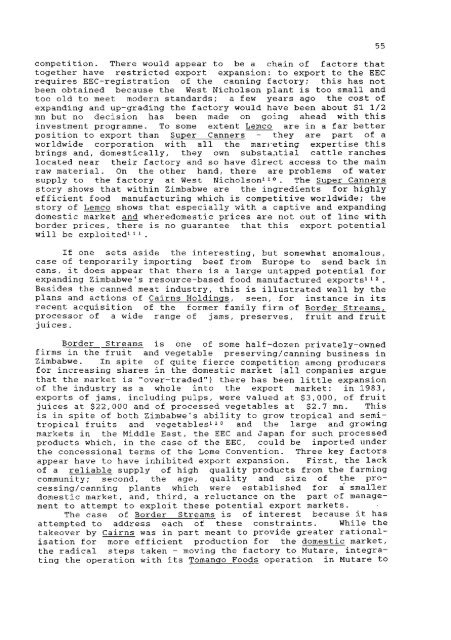Zimbabwe - Overseas Development Institute
Zimbabwe - Overseas Development Institute
Zimbabwe - Overseas Development Institute
You also want an ePaper? Increase the reach of your titles
YUMPU automatically turns print PDFs into web optimized ePapers that Google loves.
competition. There would appear to be a chain of f a c t o r s that<br />
together have r e s t r i c t e d export expansion: to export to the EEC<br />
requires E E C - r e g i s t r a t i o n of the canning f a c t o r y ; t h i s has not<br />
been obtained because the West Nicholson plant i s too small and<br />
too o l d to meet modern standards; a few years ago the cost of<br />
expanding and up-grading the f a c t o r y would have been about $1 1/2<br />
mn but no d e c i s i o n has been made on going ahead with t h i s<br />
investment programme. To some extent Lemco are i n a f a r b e t t e r<br />
p o s i t i o n to export than Super Canners - they are part of a<br />
worldwide corporation with a l l the mari'eting e x p e r t i s e t h i s<br />
brings and, d o m e s t i c a l l y , they own s u b s t a n t i a l c a t t l e ranches<br />
located near t h e i r f a c t o r y and so have d i r e c t access to the main<br />
raw m a t e r i a l . On the other hand, there are problems of water<br />
supply to the f a c t o r y at West N i c h o l s o n ' . The Super Canners<br />
s t o r y shows that w i t h i n <strong>Zimbabwe</strong> are the i n g r e d i e n t s f o r h i g h l y<br />
e f f i c i e n t food manufacturing which i s competitive worldwide; the<br />
story of Lemco shows that e s p e c i a l l y with a captive and expanding<br />
domestic market and wheredomestic p r i c e s are not out of l i n e with<br />
border p r i c e s , there i s no guarantee that t h i s export p o t e n t i a l<br />
w i l l be e x p l o i t e d ' ' ' .<br />
I f one sets aside the i n t e r e s t i n g , but somewhat anomalous,<br />
case of temporarily importing beef from Europe to send back i n<br />
cans, i t does appear that there i s a large untapped p o t e n t i a l f o r<br />
expanding <strong>Zimbabwe</strong>'s resource-based food manufactured exports''^.<br />
Besides the canned meat industry, t h i s i s i l l u s t r a t e d w e l l by the<br />
plans and actions of Cairns Holdings, seen, f o r instance i n i t s<br />
recent a c q u i s i t i o n of the former family f i r m of Border Streams,<br />
processor of a wide range of jams, preserves, f r u i t and f r u i t<br />
j u i c e s .<br />
Border Streams i s one of some half-dozen privately-owned<br />
firms i n the f r u i t and vegetable preserving/canning business i n<br />
<strong>Zimbabwe</strong>. In s p i t e of quite f i e r c e competition among producers<br />
f o r i n c r e a s i n g shares i n the domestic market ( a l l companies argue<br />
that the market i s "over-traded") there has been l i t t l e expansion<br />
of the i n d u s t r y as a whole i n t o the export market: i n 1983,<br />
exports of jams, i n c l u d i n g pulps, were valued at $3,000, of f r u i t<br />
j u i c e s at $22,000 and of processed vegetables at $2.7 mn. This<br />
i s i n s p i t e of both <strong>Zimbabwe</strong>'s a b i l i t y to grow t r o p i c a l and semit<br />
r o p i c a l f r u i t s and v e g e t a b l e s ' " and the large and growing<br />
markets i n the Middle East, the EEC and Japan f o r such processed<br />
products which, i n the case of the EEC, could be imported under<br />
the concessional terms of the Lome Convention. Three key f a c t o r s<br />
appear have to have i n h i b i t e d export expansion. F i r s t , the lack<br />
of a r e l i a b l e supply of high q u a l i t y products from the farming<br />
community; second, the age, q u a l i t y and s i z e of the processing/canning<br />
plants which were e s t a b l i s h e d f o r a smaller<br />
domestic market, and, t h i r d , a reluctance on the part of management<br />
to attempt to e x p l o i t these p o t e n t i a l export markets.<br />
The case of Border Streams i s of i n t e r e s t because i t has<br />
attempted to address each of these c o n s t r a i n t s . While the<br />
takeover by Cairns was i n part meant to provide greater r a t i o n a l <br />
i s a t i o n f o r more e f f i c i e n t production f o r the domestic market,<br />
the r a d i c a l steps taken - moving the f a c t o r y to Mutare, i n t e g r a <br />
t i n g the operation with i t s Tomanqo Foods operation i n Mutare to
















